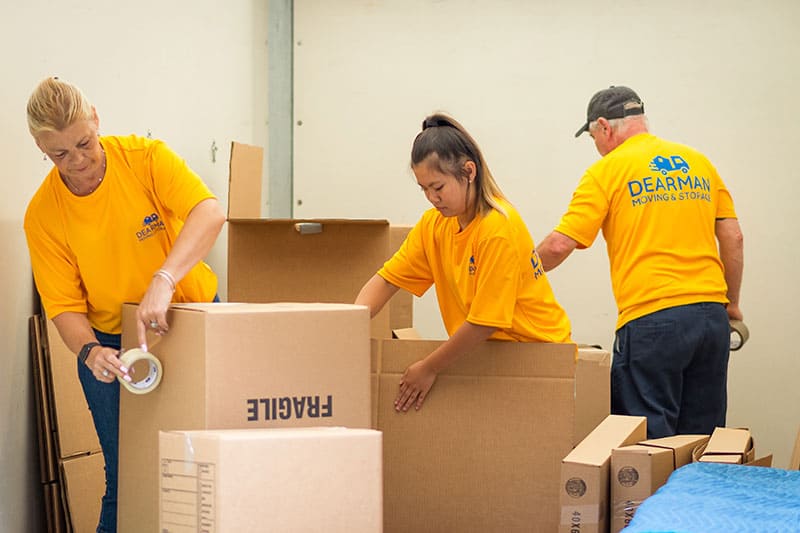Recognizing the Inclusions of moving and Freight Forwarding worldwide of Domestic and Global Delivery
Steering via the intricacies of moving and Freight forwarding can be challenging. Both processes entail distinct procedures and needs that are vital for effective transportation. Comprehending the distinctions in logistics, documentation, and threat administration is crucial for businesses and people alike. This knowledge can significantly affect the effectiveness and safety of shipments. Many are unaware of the particular parts that influence the general experience and outcomes. What factors should one consider to assure a smooth changeover?
The Basics of moving and Freight Forwarding
moving and Freight forwarding are basic components of the international logistics industry. They promote the transfer of goods and individual possessions throughout domestic and worldwide boundaries. moving primarily involves the relocation of people or family members, encompassing industrial and domestic requirements. It usually includes packaging, loading, delivering, and unpacking things at the location. In comparison, Freight forwarding is concentrated on the shipment of items, often in bulk, using numerous transport modes, such as land.freight, sea, or air forwarders act as middlemans, working with logistics to ensure timely delivery while steering via complicated policies and customizeds treatments. Both procedures need mindful planning, company, and interaction to assure efficiency and minimize disturbances. Understanding these principles is important for anybody entailed in logistics, as they prepared for advanced facets of delivery and transport management.
Trick Components of Freight Forwarding Providers
Freight forwarding solutions include several crucial components that ensure smooth transport of items. Secret obligations of Freight forwarders include taking care of logistics, collaborating deliveries, and taking care of personalizeds clearance. In addition, understanding important delivery documents is critical for compliance and effective activity of cargo.
Freight Forwarder Responsibilities
A reputable Freight forwarder plays an important function in working with the transportation of goods, making certain that shipments are managed successfully and in conformity with laws. Their duties encompass numerous key jobs, consisting of selecting suitable transport paths, bargaining Freight prices, and handling logistics. They function as intermediaries between carriers and shippers, making certain that freight is properly packaged and labeled for safe transit. Furthermore, Freight forwarders track shipments, supplying updates to clients regarding the status and anticipated delivery times. They likewise assess and manage threats associated with transportation, advising insurance policy options as required. By facilitating interaction and documents, Freight forwarders enhance the shipping process, decreasing prospective hold-ups and improving general supply chain effectiveness.
Shipping Documents Fundamentals

Recognizing Customs Clearance and Documentation
Precise paperwork is crucial in the custom-mades clearance procedure, as it ensures compliance with different laws. An overview of personalizeds laws highlights the complexities encountered by shippers and Freight forwarders. Usual clearance obstacles can considerably influence shipment timelines and costs, making understanding this aspect vital for effective logistics.
Value of Accurate Documentation
Steering via the complexities of global shipping needs a keen understanding of customs clearance and the important role of paperwork. Precise paperwork is crucial for guaranteeing that shipments comply with policies and reach their destinations without hold-ups. Appropriately prepared files, including costs of lading, business invoices, and packing listings, promote smooth communications with custom-mades authorities. Errors can bring about delivery hold-ups, penalties, and even confiscation of products. Moreover, complete documents help in monitoring shipments and solving disagreements. Consequently, organizations participated in moving and Freight forwarding need to prioritize precise paperwork methods to browse the complex landscape of international delivery efficiently. This persistance not only enhances operations however additionally improves customer contentment by guaranteeing prompt delivery.
Customizeds Rules Introduction
Guiding customs guidelines is a vital aspect of international trade that straight influences the success of moving and Freight forwarding operations. Reliable customs clearance requires an understanding of numerous policies, including tolls, responsibilities, and import/export limitations. Exact documents is necessary, as it assures conformity with legal requirements and facilitates the efficient activity of goods throughout boundaries. Trick documents typically consist of industrial billings, packaging checklists, and expenses of lading, which give in-depth info concerning the delivery. In addition, personalizeds brokers play a vital function in steering complicated guidelines, working as intermediaries between personalizeds and carriers authorities. By keeping detailed knowledge of custom-mades procedures, organizations can significantly minimize delays and reduce costs associated with international delivery.
Typical Clearance Difficulties
Numerous obstacles can emerge during the customs clearance procedure, often making complex the motion of goods throughout boundaries. One significant issue wants paperwork, which can result in penalties and hold-ups. Importers and merchants have to ensure all required documents, such as billings, packing checklists, and certificates of beginning, is precise and complete. In addition, inconsistencies in valuation can cause analysis from personalizeds authorities, causing extra tasks or inspections. Language barriers may additionally present difficulties, as miscommunication can bring about misconceptions concerning laws. Additionally, modifications in custom-mades regulations can produce complication, demanding continuous caution by shippers. Ultimately, overcoming these clearance challenges needs complete prep work and a clear understanding of customs needs to promote smooth worldwide transactions.
Packaging and Classifying Needs
Typically forgotten, packaging and labeling needs play an important function in the shipping process, making certain that products are protected and easily recognizable throughout their journey (shipping overseas). Proper product packaging safeguards products from damages during transportation, while likewise assisting in reliable handling and storage space. Using appropriate products, such as bubble cover, foam, or strong boxes, can protect against breakage and loss.Labeling is equally essential. Exact and clear labels communicate essential details, consisting of the destination, handling guidelines, and materials. Labels need to adhere to laws certain to residential and worldwide delivery, which may consist of unsafe products identification or customs declarations.Moreover, standard labeling practices streamline the tracking procedure and improve general logistics efficiency. By sticking to packaging and labeling needs, companies lessen the threat of delays, damages, or misdelivery. Ultimately, these methods add greatly to the success of moving and Freight forwarding operations, guaranteeing a seamless shipping experience for all parties included
Tracking Shipments: Value and Techniques
Reliable packaging and labeling established the structure for successful check delivery monitoring, however tracking shipments is similarly essential in the delivery process. Shipment monitoring gives real-time visibility, which assists organizations and consumers monitor the development of their items. This openness enhances client satisfaction, given that customers can remain educated about delivery timelines and any type of possible delays.Several approaches facilitate effective monitoring. Barcode scanning is a common method, utilizing unique identifiers to keep an eye on plans throughout their journey. Furthermore, GPS modern technology makes it possible for precise location monitoring, enabling timely updates and improved logistics management. Many delivery business now use electronic systems and mobile applications that offer users with simple access to tracking information.The value of delivery tracking can not be overstated; it reduces the risk of lost or damaged items, boosts operational performance, and cultivates trust between recipients and carriers. Therefore, incorporating reliable tracking techniques is important for effective domestic and global delivery procedures.
Insurance policy Options for Your Product

Protecting insurance coverage for goods in transportation is a crucial consideration for services and individuals alike. Insurance coverage options differ based upon the kind of delivery, worth of goods, and particular risks included. Common kinds include copyright obligation, which covers loss or damage while in transportation, and full-value insurance, giving substantial protection for the overall value find more info of the goods.Shippers might also think about marine insurance policy for international deliveries, protecting versus threats connected with sea transportation. It is important to examine the specific requirements of the shipment and evaluate the conditions of any policy.Furthermore, understanding exclusions and constraints is critical to stay clear of prospective voids in protection. Carriers must engage with insurance professionals to check out customized solutions that fit their special scenarios. Eventually, purchasing the appropriate insurance can reduce monetary threats and give comfort during the shipping process.
Selecting the Right moving and Freight Forwarding Service
When choosing a relocating and Freight forwarding service, it is vital for individuals and organizations to carefully review their certain demands and priorities. Variables such as the volume of goods, destination, and timeline play a considerable function in this decision-making process. Investigating different suppliers is suggested; contrasting their solutions, pricing, and consumer testimonials can disclose beneficial insights.Additionally, it is essential to consider the experience and competence of the provider in managing specific kinds of cargo, specifically for worldwide deliveries that might include customizeds clearance. Openness in pricing, including any kind of covert charges, should likewise be scrutinized.Furthermore, evaluating the degree of consumer support used is vital, as prompt communication can minimize concerns during transportation (lcl shipping). Ultimately, confirming the schedule of insurance coverage options assures that products are protected throughout the delivery procedure. By taking these organizations, steps and people can make enlightened options that straighten with their logistics requirements
Frequently Asked Inquiries
What Sorts Of Product Can Be Shipped Worldwide?

Just How Do Shipping Prices Differ Between Various Carriers?
Delivering costs vary significantly between carriers because of factors such as solution rate, cargo kind, range, and added services supplied. Each copyright's rates design reflects these variables, affecting overall delivery costs for customers.
Can I Ship Hazardous Products or Perishables?
Shipping hazardous products and perishables is subject to rigorous regulations. Carriers commonly call for details packaging, labeling, and documents. Shippers must assure compliance with neighborhood and worldwide legislations to prevent fines and guarantee risk-free transport.
What Should I Do if My Shipment Is Postponed?
When faced with a delivery delay, one should first contact the provider for updates. Evaluate any kind of alerts obtained, assess different services, and maintain all events informed regarding the circumstance to decrease disruptions.
Are There Weight Boundary for Delivery Containers?
Weight restrictions for shipping containers differ depending on aspects like container dimension and delivery laws. Generally, basic containers have an optimum gross weight of around 30,000 to 32,000 kilograms to ensure risk-free transport and handling. In contrast, Freight forwarding is focused on the shipment of items, usually in mass, making use of different transportation modes, such as land.freight, air, or sea forwarders act as middlemans, collaborating logistics to guarantee timely distribution while steering with complex regulations and customs treatments. Secret obligations of Freight forwarders consist of managing logistics, working with deliveries, and dealing with customs clearance. A dependable Freight forwarder plays an important function in collaborating the transportation of goods, making certain that deliveries are handled successfully and in compliance with guidelines. Reliable packaging and labeling set the structure for effective delivery management, however tracking shipments is similarly essential in the shipping procedure. Lots of shipping firms currently offer electronic systems and mobile applications that give individuals with easy accessibility to tracking information.The value of look what i found shipment monitoring can not be overstated; it lessens the risk of lost or damaged products, improves functional performance, and promotes trust in between shippers and receivers.